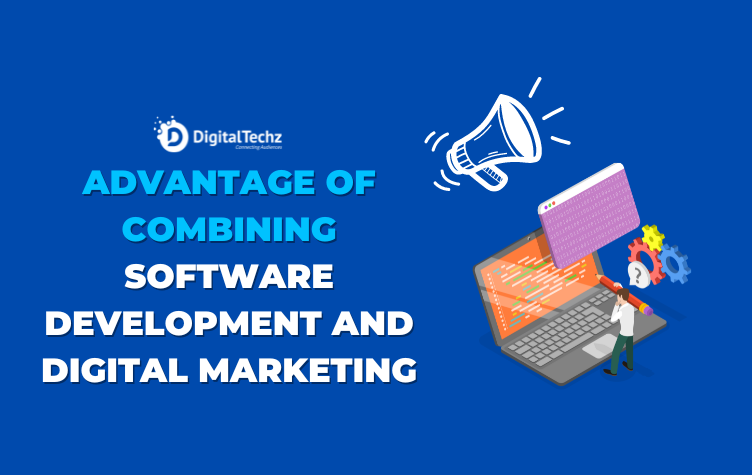Combining Software Development and Digital Marketing
Introduction
In today’s fast-paced digital landscape, businesses are constantly seeking innovative ways to stand out and thrive. One strategy that has gained significant traction is the integration of software development and digital marketing. By seamlessly combining these two disciplines, companies can unlock a multitude of advantages that drive growth, enhance brand visibility, and maximize market impact.
Understanding the Combining Software Development and Digital Marketing
At first glance, software development and digital marketing may seem like distinct domains with little overlap. However, upon closer examination, it becomes evident that they are complementary forces that, when combined, form a powerful synergy. Software development focuses on creating cutting-edge products and services, while digital marketing is concerned with promoting these offerings to the target audience. By integrating these functions, businesses can create cohesive strategies that span from conception to conversion.
The Business Case for Integration
Efficiency and Cost-Effectiveness
Outsourcing software development and digital marketing to separate agencies can be time-consuming and costly. By consolidating these services under one roof, businesses can streamline processes, minimize communication barriers, and reduce overhead expenses. This approach ensures seamless coordination and synergy between development and marketing efforts, ultimately leading to greater efficiency and cost-effectiveness.
Access to Specialized Expertise
Combining software development and digital marketing allows businesses to tap into a diverse pool of specialized expertise. Whether it’s coding, UI/UX design, SEO, or content marketing, an integrated agency can provide comprehensive solutions tailored to the unique needs of each project. This access to diverse skill sets enables businesses to stay ahead of the curve and adapt to evolving market trends.
Alignment of Objectives
When software development and digital marketing teams operate in silos, there is often a disconnect between product creation and promotion. By integrating these functions, businesses can ensure alignment of objectives and messaging throughout the entire product lifecycle. This holistic approach fosters synergy between development milestones and marketing initiatives, resulting in a more cohesive and impactful brand experience.
Strategies for Success
Early Collaboration
Effective integration begins with early collaboration between development and marketing teams. By involving marketers in the initial stages of product ideation, businesses can gain valuable insights into market trends, user preferences, and competitive landscapes. This proactive approach ensures that marketing strategies are seamlessly woven into the fabric of product development, resulting in a more cohesive and market-ready offering.
Agile Iteration
In today’s dynamic digital landscape, agility is key to success. By adopting agile development methodologies, businesses can rapidly iterate on product features, incorporate user feedback, and pivot marketing strategies accordingly. This iterative approach enables businesses to stay nimble and responsive to changing market dynamics, ensuring that their offerings remain relevant and competitive.
Data-Driven Decision Making
Data lies at the heart of successful integration. By leveraging analytics and performance metrics, businesses can gain valuable insights into user behavior, campaign effectiveness, and market trends. This data-driven approach empowers businesses to make informed decisions, optimize marketing strategies, and maximize ROI across both development and marketing initiatives.
Key Considerations
Cultural Alignment
Effective integration requires more than just technical expertise; it requires cultural alignment between development and marketing teams. By fostering a culture of collaboration, transparency, and mutual respect, businesses can break down silos and promote synergy across all facets of the organization. This cultural alignment lays the foundation for successful integration and long-term growth.
Continuous Learning
The digital landscape is constantly evolving, requiring businesses to stay abreast of emerging trends, technologies, and best practices. By fostering a culture of continuous learning and professional development, businesses can equip their teams with the skills and knowledge needed to succeed in an ever-changing environment. This commitment to learning ensures that businesses remain agile, innovative, and competitive in the digital marketplace.
Customer-Centricity
At the end of the day, success hinges on one key factor: the customer. By placing the customer at the center of every decision, businesses can create products and marketing campaigns that resonate with their target audience. This customer-centric approach fosters loyalty, drives engagement, and ultimately leads to sustainable growth and success.
Conclusion
In conclusion, the advantage of combining software development and digital marketing cannot be overstated. By integrating these functions, businesses can unlock a multitude of benefits, including efficiency, cost-effectiveness, access to specialized expertise, and alignment of objectives. By adopting strategies such as early collaboration, agile iteration, and data-driven decision making, businesses can maximize the impact of their integrated efforts and achieve sustained success in the digital marketplace.
Get connected with DigitalTechz – Software Development and Digital marketing company in India, we provide best products and services for your complete business. Digitaltechz develop the product and do marketing, ad campaigns to reach the maximum customers.
FAQs
What are the key benefits of combining software development and digital marketing?
Combining software development and digital marketing offers benefits such as efficiency, cost-effectiveness, access to specialized expertise, and alignment of objectives, leading to greater synergy and impact.
How can businesses ensure successful integration of development and marketing efforts?
Businesses can ensure successful integration through early collaboration, agile iteration, data-driven decision making, cultural alignment, continuous learning, and a customer-centric approach.
Why is cultural alignment important for integration?
Cultural alignment fosters collaboration, transparency, and mutual respect between development and marketing teams, laying the foundation for synergy and long-term growth.
Advantage of Combining Software Development and Digital Marketing
2024-04-18 12:00:45
